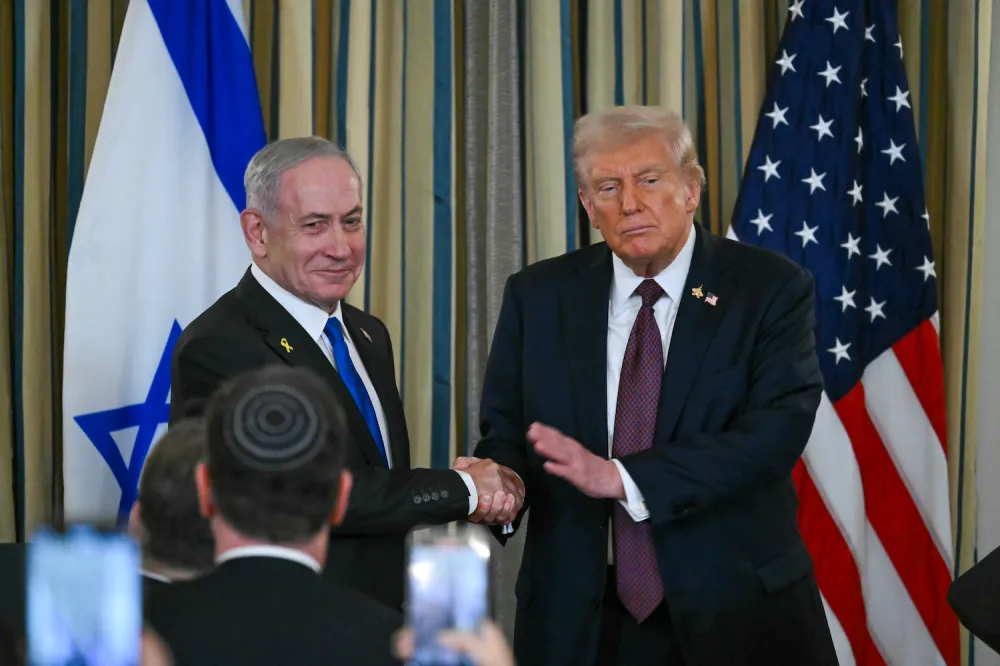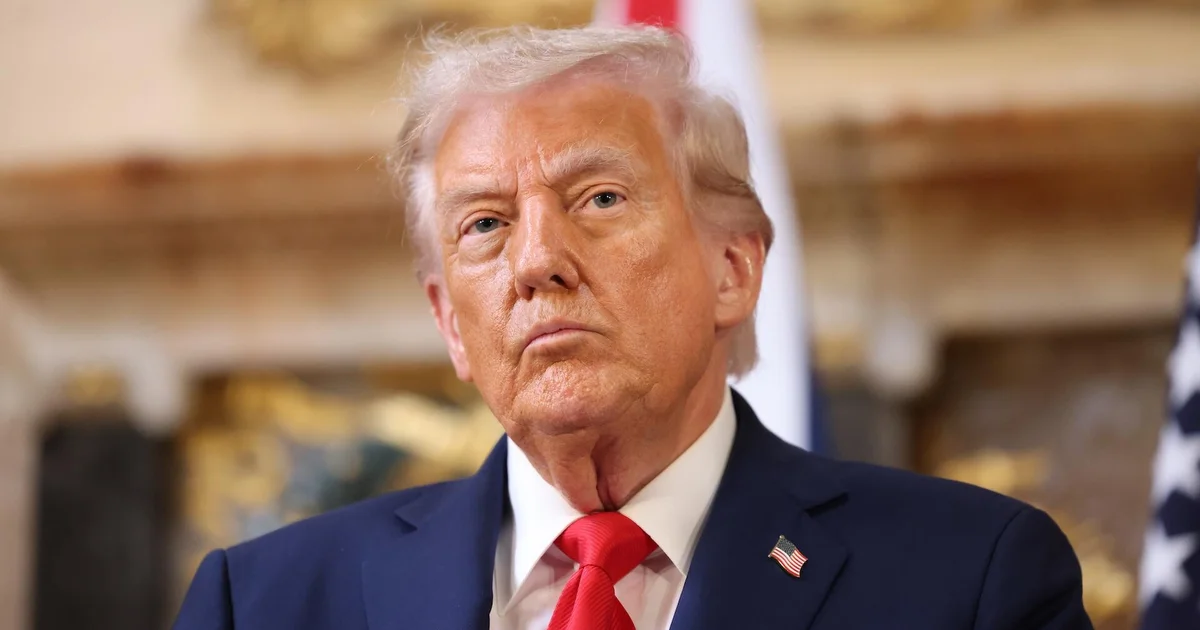
Welcome back to World Brief, where we’re looking at a U.S.-led peace proposal to end the Israel-Hamas war, how Russia lost Moldova’s parliamentary elections, and another powerful typhoon hitting Southeast Asia.
New Demands for Peace in Gaza
U.S. President Donald Trump unveiled his latest peace proposal to end the Israel-Hamas war on Monday, standing alongside Israeli Prime Minister Benjamin Netanyahu. The plan laid out a series of demands that Hamas has publicly rejected in the past, making experts skeptical that this latest iteration will make substantial headway to end the conflict.
Under Trump’s proposal, Israel and Hamas would immediately cease all fighting in Gaza. Hamas would return all of its hostages within 72 hours of the deal’s passage, and in exchange, Israel would release 250 life-sentence prisoners as well as 1,700 Gazans who were detained after the Hamas attack on Israel on Oct. 7, 2023.
The deal makes no mention of Israel’s full withdrawal from Gaza, a key Hamas demand, though it does leave the door open for a pathway to Palestinian statehood, which several nations historically close to Israel have recently recognized.
The plan would establish an international transitional body, known as the Board of Peace, that Trump would personally oversee; this body would provide oversight and supervision to a committee made up of Palestinians and international experts. The board would also include former British Prime Minister Tony Blair, who has put forward his own peace plan to end the war in Gaza.
Unlike Blair’s proposal, which would hinge on a United Nations-mandated administration, Trump’s plan would pave the way for a new civilian-led government to oversee Gaza. This would not include Hamas or the Palestinian Authority (PA), which governs parts of the occupied West Bank.
However, Trump and Netanyahu agreed that the PA could become involved in governance once it completed a reform program that Netanyahu described on Monday as a “radical and complete transformation.” Such a requirement directly contradicts the New York declaration, another peace proposal backed by 142 nations in September that calls for PA governance in Gaza.
Among the other points of Trump’s deal, Israel would be required to allow aid to enter Gaza unimpeded, a Trump economic development plan would go into effect to “rebuild and energize Gaza,” and displaced Palestinians would be encouraged to return to their homes. This appears to be an about-face for Trump, who in February called for the removal of all Palestinians in Gaza to pursue a “Riviera of the Middle East” real estate scheme.
If Hamas rejects the U.S.-led proposal, though, “Israel would have my full backing to finish the job of destroying the threat of Hamas,” Trump said on Monday, with Netanyahu adding that “this can be done the easy way or the hard way.” Hamas was notably not involved in the latest round of talks.
Today’s Most Read
India and the Rebalancing of Asia by C. Raja Mohan
Robert McNamara Chose Loyalty to the President by Julian E. Zelizer
After Trump Turned on Putin, Is Netanyahu Next? by Daniel Byman
The World This Week
Tuesday, Sept. 30: The U.N. General Assembly holds a high-level meeting on the Rohingya crisis in Myanmar.
Japanese Prime Minister Shigeru Ishiba begins a two-day visit to South Korea.
Wednesday, Oct. 1: Denmark holds an informal European Union leaders’ summit before hosting the seventh European Political Community Summit the following day.
China kicks off its new K visa aimed at attracting foreign technology talent.
Friday, Oct. 3: The Czech Republic begins holding two-day parliamentary elections.
Saturday, Oct. 4: Japan’s Liberal Democratic Party holds a leadership vote.
Georgia holds local elections.
Sunday, Oct. 5: Syria holds parliamentary elections.
What We’re Following
Win for the West. Moldova’s pro-European ruling party secured a major victory over its Russia-leaning opponent in the country’s parliamentary elections on Sunday, preliminary results show. Winning 50.2 percent of the vote allows President Maia Sandu’s Party of Action and Solidarity to breathe a sigh of relief after repeatedly accusing Moscow of trying to influence the election in the Kremlin’s favor.
“This is not just a party’s victory — it is Moldova’s victory,” Sandu wrote on X. “The European path is our way forward.”
Sandu’s government, along with several of Moldova’s European allies, had accused Russia of vote-buying and disinformation schemes. The Kremlin has denied allegations of meddling, though, instead accusing Moldova (without evidence) of preventing hundreds of thousands of Moldovan citizens in Russia from voting. Moldova’s pro-Russian party also issued similar allegations regarding those living in the pro-Russian separatist state of Transnistria.
Following Russia’s full-scale invasion of Ukraine in February 2022, the former Russian satellite state has pushed closer to Europe—applying to join the European Union and vehemently condemning Moscow’s war. On Monday, European leaders hailed Moldova’s election results as a key win for the West and a foreshadowing of the country’s eventual accession into the European bloc.
Now, Sandu is expected to once again nominate Prime Minister Dorin Recean to form a government, which then will need parliamentary approval.
Another typhoon hits Southeast Asia. Typhoon Bualoi slammed into Vietnam’s central coast on Monday, killing at least 13 people and injuring some 46 others. This brings the storm’s total death toll to at least 23 people, including 10 who died in the Philippines over the weekend.
Nearly 2 million homes have lost electricity, flash floods and landslides have inundated crops, airports have suspended flights, and more than a dozen people remain missing. Bualoi is expected to hit Laos next, though it has weakened. However, further heavy rain is forecasted for Vietnam later this week.
The typhoon comes just days after Southeast Asia was struck by another devastating storm: Typhoon Ragasa, which meteorologists called the world’s most powerful tropical cyclone so far this year. At least 27 people were killed in that storm, primarily in the Philippines and Taiwan, and nearly 2 million people were forced to evacuate.
Snapback sanctions. On Sunday, the United Nations reimposed snapback sanctions on Iran over its nuclear program. This was the second time that Iran and its U.N. Security Council allies, Russia and China, have failed to extend sanctions relief for the country since the Iran nuclear deal—known as the Joint Comprehensive Plan of Action (JCPOA)—went into effect in 2015.
France, Germany, and the United Kingdom initiated snapback proceedings in August, citing Iran’s repeated failure to comply with its obligations to the International Atomic Energy Agency. “Its nuclear programme therefore remains a clear threat to international peace and security,” the countries’ foreign ministers said in a joint statement at the time. The United States, which abandoned the JCPOA in 2018, has applauded the move.
However, Iran insists that its nuclear program is for civilian purposes. “Iran has not, does not, and will not seek a nuclear weapon,” President Masoud Pezeshkian told reporters last Friday. “We are ready to negotiate.”
Snapback sanctions will freeze Iranian assets abroad, halt arms deals with Tehran, and penalize the development of its ballistic missile program, among other measures. They are expected to further harm Iran’s stagnant economy by raising food prices and increasing the cost of living.
Already, the European Union on Monday reinstated its sanctions; imposed travel bans on some Iranian officials; and barred the sale of crude oil, gold, and certain naval equipment to Iran.
Odds and Ends
Tens of thousands of people voted on their favorite avian species in New Zealand’s Bird of the Year contest. And on Monday, the Karearea (the Indigenous Maori name for New Zealand’s falcon) was crowned this year’s winner. The annual competition is a way to draw attention to Wellington’s diverse native bird species, most of whom face some degree of danger.
“This is not a land of lions, tigers, and bears,” Forest and Bird chief executive Nicola Toki said. “The birds here are weird and wonderful and not what you would expect to see perhaps in other countries.”



